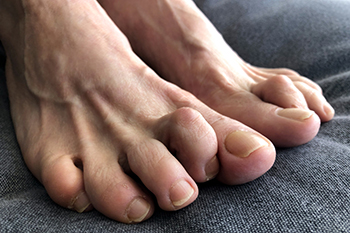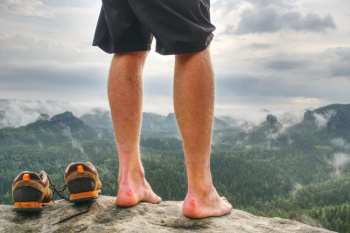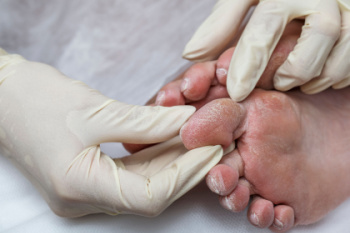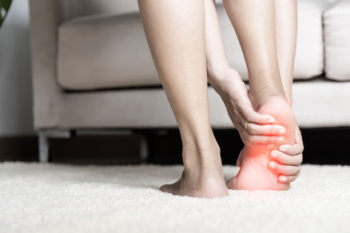September 2024
Relief Options for Hammertoe

Hammertoe is a deformity where one of the toes, often the second, becomes bent in a fixed Z-shaped position. This causes discomfort and difficulty in wearing certain types of shoes and walking. Hammertoe is often the result of tendon imbalances, long metatarsal bones, and poor joint alignment. Rheumatoid arthritis, genetics, or prolonged wearing of ill-fitting shoes are other factors. The bent position of the toe can lead to excessive friction, which can result in painful calluses, corns, and even open sores on top of the affected toe. Treatment options typically involve wearing shoes with a wider toe box to reduce irritation, using orthotic devices to alleviate pain in the ball of the foot, and taping or splinting the toe to provide temporary relief. In more severe cases, where the toe is rigidly fixed and pain persists, surgery may be required to straighten the toe. If you have a painful hammertoe, it is suggested that you schedule an appointment with a podiatrist for a diagnosis and treatment options.
Hammertoe
Hammertoes can be a painful condition to live with. For more information, contact one of our podiatrists from Advanced Foot & Ankle Associates, PLLC. Our doctors will answer any of your foot- and ankle-related questions.
Hammertoe is a foot deformity that affects the joints of the second, third, fourth, or fifth toes of your feet. It is a painful foot condition in which these toes curl and arch up, which can often lead to pain when wearing footwear.
Symptoms
- Pain in the affected toes
- Development of corns or calluses due to friction
- Inflammation
- Redness
- Contracture of the toes
Causes
Genetics – People who are genetically predisposed to hammertoe are often more susceptible
Arthritis – Because arthritis affects the joints in your toes, further deformities stemming from arthritis can occur
Trauma – Direct trauma to the toes could potentially lead to hammertoe
Ill-fitting shoes – Undue pressure on the front of the toes from ill-fitting shoes can potentially lead to the development of hammertoe
Treatment
Orthotics – Custom made inserts can be used to help relieve pressure placed on the toes and therefore relieve some of the pain associated with it
Medications – Oral medications such as anti-inflammatories or NSAIDs could be used to treat the pain and inflammation hammertoes causes. Injections of corticosteroids are also sometimes used
Surgery – In more severe cases where the hammertoes have become more rigid, foot surgery is a potential option
If you have any questions please contact one of our offices located in Lake Worth and Aledo/Willow Park, TX . We offer the newest diagnostic and treatment technologies for all your foot and ankle needs.
Understanding and Preventing Hiking Blisters

Blisters while hiking often result from friction between the skin and footwear, worsened by moisture and heat. Causes include wearing ill-fitting shoes, worn-out footwear, or improper socks that do not wick moisture effectively. Extended hikes and rough terrain can also contribute to blister formation. To prevent blisters, ensure you wear well-fitting shoes that have been properly broken in before hitting the trails. Opt for moisture-wicking socks made of synthetic fibers or merino wool, and consider using blister prevention tape on high-friction areas. Keeping your feet dry is important, so change wet socks promptly and use footpowder to reduce moisture. Regularly check your feet during hikes and address any signs of discomfort early. If you have developed a painful blister, or have recurring blisters from hiking, it is suggested that you schedule an appointment with a podiatrist who can offer you relief methods.
Blisters are prone to making everyday activities extremely uncomfortable. If your feet are hurting, contact one of our podiatrists of Advanced Foot & Ankle Associates, PLLC. Our doctors can provide the care you need to keep you pain-free and on your feet.
Foot Blisters
Foot blisters develop as a result of constantly wearing tight or ill-fitting footwear. This happens due to the constant rubbing from the shoe, which can often lead to pain.
What Are Foot Blisters?
A foot blister is a small fluid-filled pocket that forms on the upper-most layer of the skin. Blisters are filled with clear fluid and can lead to blood drainage or pus if the area becomes infected.
How Do Blisters Form?
Blisters on the feet are often the result of constant friction of skin and material, usually by shoe rubbing. Walking in sandals, boots, or shoes that don’t fit properly for long periods of time can result in a blister. Having consistent foot moisture and humidity can easily lead to blister formation.
Prevention & Treatment
It is important to properly care for the affected area in order to prevent infection and ease the pain. Do not lance the blister and use a Band-Aid to provide pain relief. Also, be sure to keep your feet dry and wear proper fitting shoes. If you see blood or pus in a blister, seek assistance from a podiatrist.
If you have any questions, please feel free to contact one of our offices located in Lake Worth and Aledo/Willow Park, TX . We offer the newest diagnostic and treatment technologies for all your foot care needs.
The Importance of Diabetic Foot Care

Diabetic foot care is essential for maintaining overall health and preventing serious complications. Regular foot exams are critical as they help detect any issues early, such as sores, infections, or changes in foot structure, which can be particularly dangerous for individuals with diabetes. Daily foot care is equally important, and this includes inspecting feet for any abnormalities, keeping them clean and moisturized, and trimming nails carefully to avoid cuts and infections. Adopting healthy foot habits, such as wearing well-fitting shoes and avoiding walking barefoot, significantly reduces the risk of injury and infection. By adhering to these practices, individuals with diabetes can manage their foot health effectively, preventing complications and promoting overall well-being. If you have diabetes, it is strongly suggested that you are under the care of a podiatrist who can help you to manage this potentially dangerous condition.
Diabetic foot care is important in preventing foot ailments such as ulcers. If you are suffering from diabetes or have any other concerns about your feet, contact one of our podiatrists from Advanced Foot & Ankle Associates, PLLC. Our doctors can provide the care you need to keep you pain-free and on your feet.
Diabetic Foot Care
Diabetes affects millions of people every year. The condition can damage blood vessels in many parts of the body, especially the feet. Because of this, taking care of your feet is essential if you have diabetes, and having a podiatrist help monitor your foot health is highly recommended.
The Importance of Caring for Your Feet
- Routinely inspect your feet for bruises or sores.
- Wear socks that fit your feet comfortably.
- Wear comfortable shoes that provide adequate support.
Patients with diabetes should have their doctor monitor their blood levels, as blood sugar levels play such a huge role in diabetic care. Monitoring these levels on a regular basis is highly advised.
It is always best to inform your healthcare professional of any concerns you may have regarding your feet, especially for diabetic patients. Early treatment and routine foot examinations are keys to maintaining proper health, especially because severe complications can arise if proper treatment is not applied.
If you have any questions please feel free to contact one of our offices located in Lake Worth and Aledo/Willow Park, TX . We offer the newest diagnostic and treatment technologies for all your foot and ankle needs.
Are You Suffering From Ingrown Toenails?
Heel Pain Caused by Bursitis

Heel pain can be debilitating, and one common cause is bursitis. This condition occurs when the bursa, a small fluid-filled sac that cushions and lubricates the joints, becomes inflamed. In the case of heel bursitis, the bursa located at the back of the heel becomes irritated and swollen. The bursa is typically aggravated by activities that put pressure on the affected area, such as walking or wearing tight shoes. Inflammation can also be caused by repetitive overuse or direct trauma to the heel. Diagnosis usually involves a physical examination, and sometimes imaging tests like X-rays or ultrasound are used to rule out other conditions. In some cases, a podiatrist may recommend corticosteroid injections to alleviate pain and inflammation. If heel pain persists or disrupts daily activities, it is suggested you make an appointment with a podiatrist. This foot doctor can offer specialized treatment and personalized advice for effective pain management and recovery.
Many people suffer from bouts of heel pain. For more information, contact one of our podiatrists of Advanced Foot & Ankle Associates, PLLC. Our doctors can provide the care you need to keep you pain-free and on your feet.
Causes of Heel Pain
Heel pain is often associated with plantar fasciitis. The plantar fascia is a band of tissues that extends along the bottom of the foot. A rip or tear in this ligament can cause inflammation of the tissue.
Achilles tendonitis is another cause of heel pain. Inflammation of the Achilles tendon will cause pain from fractures and muscle tearing. Lack of flexibility is also another symptom.
Heel spurs are another cause of pain. When the tissues of the plantar fascia undergo a great deal of stress, it can lead to ligament separation from the heel bone, causing heel spurs.
Why Might Heel Pain Occur?
- Wearing ill-fitting shoes
- Wearing non-supportive shoes
- Weight change
- Excessive running
Treatments
Heel pain should be treated as soon as possible for immediate results. Keeping your feet in a stress-free environment will help. If you suffer from Achilles tendonitis or plantar fasciitis, applying ice will reduce the swelling. Stretching before an exercise like running will help the muscles. Using all these tips will help make heel pain a condition of the past.
If you have any questions please contact one of our offices located in Lake Worth and Aledo/Willow Park, TX . We offer the newest diagnostic and treatment technologies for all your foot and ankle needs.
Blog Archives
- April 2025
- March 2025
- February 2025
- January 2025
- December 2024
- November 2024
- October 2024
- September 2024
- August 2024
- July 2024
- June 2024
- May 2024
- April 2024
- March 2024
- February 2024
- January 2024
- December 2023
- November 2023
- October 2023
- September 2023
- August 2023
- July 2023
- June 2023
- May 2023
- April 2023
- March 2023
- February 2023
- January 2023
- December 2022
- November 2022
- October 2022
- September 2022
- August 2022
- July 2022
- June 2022
- May 2022
- April 2022
- March 2022
- February 2022
- January 2022
- December 2021
- November 2021
- October 2021
- September 2021
- August 2021
- July 2021
- June 2021
- May 2021
- April 2021
- March 2021
- February 2021
- January 2021
- December 2020
- November 2020
- October 2020
- September 2020
- August 2020
- July 2020
- June 2020
- May 2020
- April 2020
- March 2020
- February 2020
- January 2020
- December 2019
- November 2019
- October 2019
- September 2019
- August 2019
- July 2019
- June 2019
- May 2019
- April 2019
- March 2019
- February 2019
- January 2019
- December 2018
- November 2018
- October 2018





